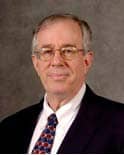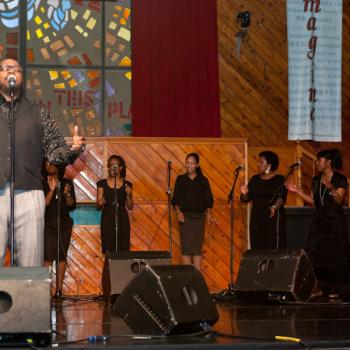John Haught
 Both science and religion are in search of understanding and truth. The goal of science is to find out how nature works. The goal of religion is to awaken us to the infinite mystery that encompasses, grounds, and sustains the natural world. Both science and religion are much more than this, of course, but since I must be brief here, my main point is that science and religion seek truth in radically different ways. Scientists, for example, want to grasp the intelligibility of the natural world and express it in mathematical terms. Religion, among other concerns, asks why the natural world exists and why it is intelligible at all.
Both science and religion are in search of understanding and truth. The goal of science is to find out how nature works. The goal of religion is to awaken us to the infinite mystery that encompasses, grounds, and sustains the natural world. Both science and religion are much more than this, of course, but since I must be brief here, my main point is that science and religion seek truth in radically different ways. Scientists, for example, want to grasp the intelligibility of the natural world and express it in mathematical terms. Religion, among other concerns, asks why the natural world exists and why it is intelligible at all.
As long as they are not competing, science and religion cannot contradict each other. No competition, no conflict. Yet many people still assume that science and religion can, and often do, contradict each other. This is especially true of current debates about the accuracy of Darwin's theory of evolution. In the United States, the appearance of conflict is based in great part on a questionable assumption to which both anti-Darwinian Christians and anti-theistic evolutionary materialists still cling. This shared assumption is that the Bible, since it is supposed to be the "inerrant" word of God, should be, at the very least, an authoritative source of scientific truth.
Historically such an expectation is silly. The biblical books and other ancient religious texts were composed long before the scientific revolution and way before the lifetimes of Galileo, Darwin, and Einstein. They aim for a kind of truth that science cannot provide. Unlike science, religions seek a truth that grasps us more than we can grasp it. It is a kind of truth that challenges and changes us in a way that science cannot. It has the power to renew us in every age, scientific or not.
Today, however, an immense obstacle stands in the way of genuine contact with the powerfully transformative meaning of our religious classics. This obstacle, contrary to what many scholars have claimed, is not science. Science itself is a perfectly reasonable and fruitful, though limited, way of learning some truths about the natural world. It does not conflict with religion. To people of faith, science should be taken as inherently good news. Science, after all, has enormously expanded our sense of the universe and, along with it, the opportunity to amplify our native openness to the world's encompassing Mystery and grounding Depth.
After Galileo, Darwin, and Einstein the religious sense of God, at least to attentive and reasonable people, cannot remain smaller than before. Nothing in recent experience provides more of an incentive to expand our awareness of the scope of divine creativity, or if you will, our sense of divine Mystery, than the discoveries of modern and contemporary science. Science need not diminish our sense of God, as reactionary and scientifically uninformed piety contends. Instead, scientific discovery provides every reason to enlarge our images of transcendence and, in doing so, heighten our inborn instinct to worship.
So science is not the problem. Science is an important way of learning some truths about the natural world that we could not otherwise have discovered. However, science has unintentionally generated a new kind of "literalism," one that appeals to many scientists and people of faith. It has now become possible for both scientists and many religious people to read religious texts as though they are -- or should be -- sources of scientific truth. Such literalism, however, becomes a way of buffering oneself against the transformative challenge that lies beneath the surface of classic religious texts and teachings.
A shared taste for literalism makes science and religion seem competitive and hence mutually antagonistic. Scientific literalism underlies both anti-Darwinian Christian propaganda on the one hand, and the "new atheist" repudiations of God and religion on the other. So-called creationists, for example, reject Darwinian accounts of origins because they believe the Bible has the authority to dispense the "true science" of how the universe and life began. At the same time, however, highly decorated devotees of Darwin -- the names of Daniel Dennett, Richard Dawkins, E. O. Wilson, and Jerry Coyne come to mind -- manifest the same literalist mentality when they lampoon the Bible for not giving us the true science.
The Darwinian materialist's mockery of theology is based on the anachronistic assumption that ancient holy books, if they are to prove their worth at all, should be scientifically accurate at the very least. Since the Bible fails pitifully to provide a quality grade of modern scientific truth, we may now dismiss it all as "quaint mythology." So says Daniel Dennett, a philosopher at Tufts University widely considered to be one of the great intellectuals of our time.
The widespread attachment to literalism, however, conceals the real value of science for people of faith. Ironically, one of the great contributions science makes to religion is to stipulate that we may now cease looking to sacred scriptures for information that we can gather with the use of our own senses and reason. The Bible should never be regarded as a source of scientific information, as Galileo (1564--1642) wisely prescribed several centuries ago.
We may now, therefore, surrender to science the task of satisfying our endless and entirely legitimate curiosity about the natural world and how it works. Then religious and theological inquiry may be liberated to turn their attention to the transformative meanings and truths that scientific literalism inevitably hides from view.
If, in response, you are inclined to declare, with the new atheists and Darwinian materialists, that there simply can be no such depth or truth beneath the surface of religious texts and teachings, then that claim may be taken as further evidence that the myth of scientism -- and the literalism it fosters -- is still very much with us.
John F. Haught (Ph.D. Catholic University, 1970) is Senior Fellow, Science & Religion, Woodstock Theological Center, Georgetown University. He was formerly Professor in the Department of Theology at Georgetown University (1970-2005) and Chair (1990-95). His area of specialization is systematic theology, with a particular interest in issues pertaining to science, cosmology, evolution, ecology, and religion. He is the author of numerous books, including the newly-released Making Sense of Evolution: Darwin, God and the Drama of Life (Louisville: Westminster/John Knox Press).
- Trending:
- Pope Leo Xiv
- |
- Israel
- |
- Trump
- |
- Social Justice
- |
- Peace
- |
- Love
Befriending Science: Christian Theologians Respond
May 21, 2010
Page: 2 of 4
more at patheos




